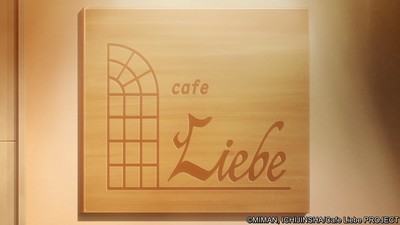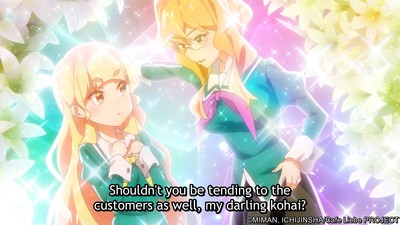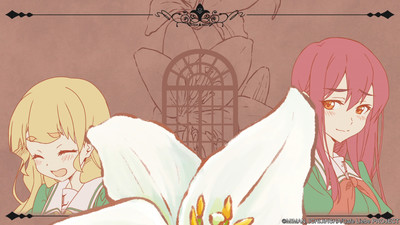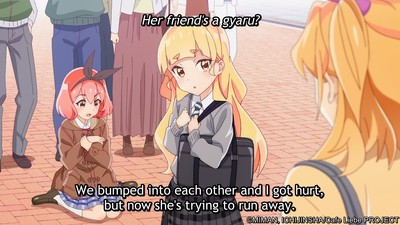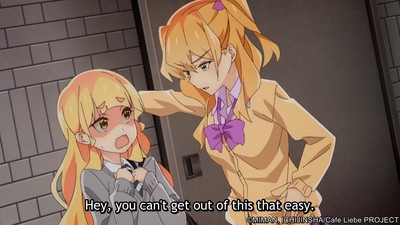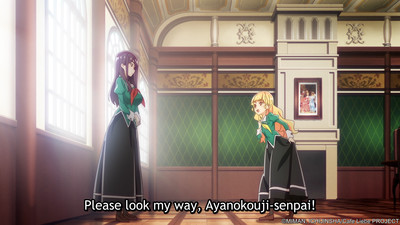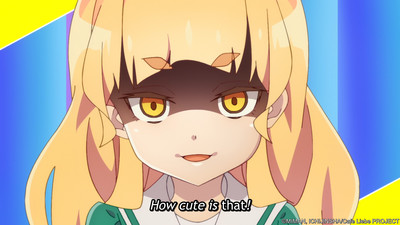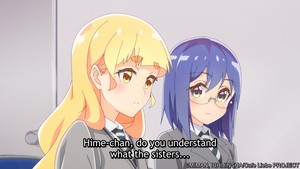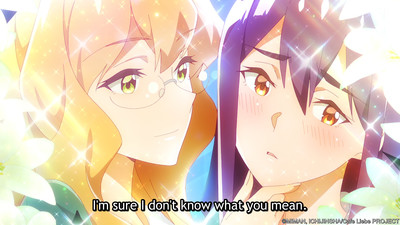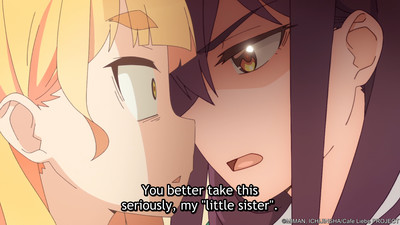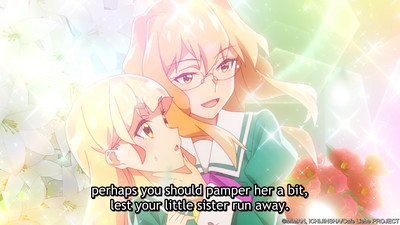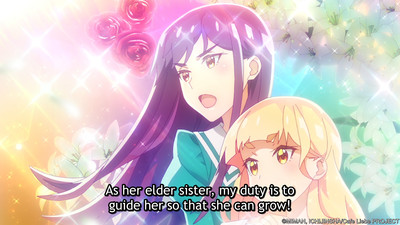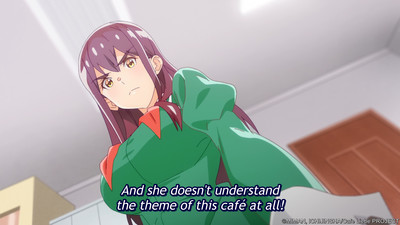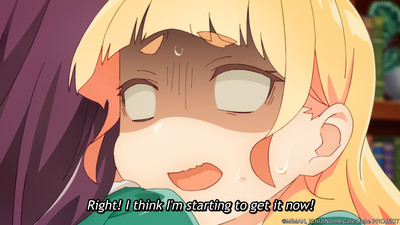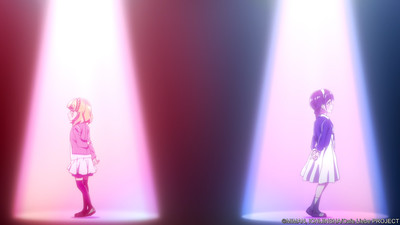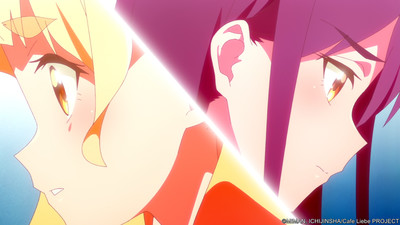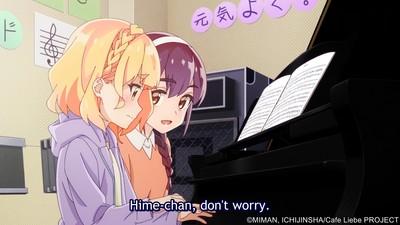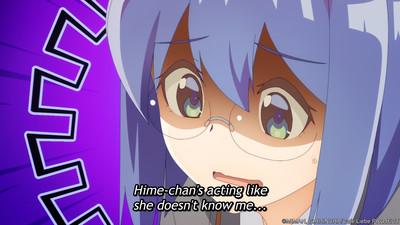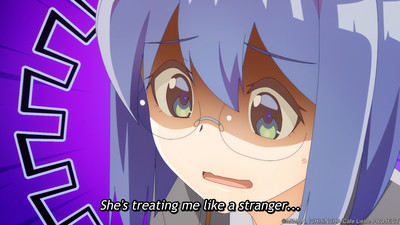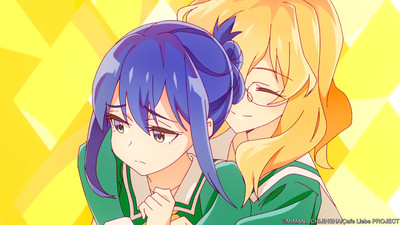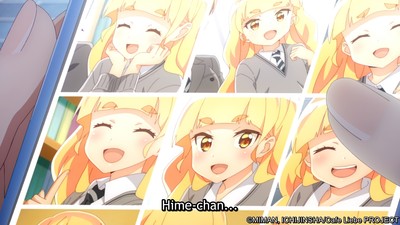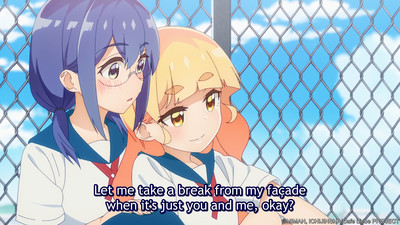What starts as a silly comedy about role-playing in a yuri-themed café turns into a rollercoaster of real emotions. Our columnists peel back the layers of performance in this gleefully metatextual rom-com.
This series is streaming on Crunchyroll.
Disclaimer: The views and opinions expressed by the participants in this chatlog are not the views of Anime News Network.
Spoiler Warning for discussion of the series ahead.
Chris
Nicky, it's Pride Month, so you know what that means! Corporations hopping aboard the rainbow capitalism train in pursuit of some special seasonal sales numbers. Like, check out this new café that opened. They
claim to be entirely staffed by private school lesbians, but between you and me, I think that might be just a marketing gimmick.


Nicky
Turns out the only thing that can beat writing about anime for your job is acting out anime for your job! Highschooler Hime Shiraki, who prizes herself on her ability to act cute, has dreams to use her finely tuned facade to earn herself a seat on the lap of luxury, unwittingly agrees to substitute as a waitress at a yuri-themed roleplaying café, where employees must act as students of a fictional private school in order to win the hearts of customers! Everything that goes on in the café might be fiction, but behind the scenes, there's real drama.
This Week, we're dishing out the deal on Yuri Is My Job!.

I recall the original manga version of
Yuri Is My Job! caught my eye a few years ago thanks to the premise. I checked out the first volume and resolved to follow up on it...eventually. You know how time gets away from us. Luckily, streaming anime adaptations and review schedules have conspired to let me properly catch up on Hime's adventures in the ship-teasing service industry.


Luckily for me, I mean. Less so for Hime. The girl may be a budding confident woman, but she's the one who finds herself less-than-scrupulously roped into role-playing at the café here. Though to be fair, if a cool gyaru kabe-don'd me into a job opportunity, I probably wouldn't be able to turn her down either.
Anyone who watched
Ouran High School Host Club back in the day may recognize this kind of a setup through coincidence as a classic farce. While Hime may be good at acting in front of real people, she's terribly unfamiliar with what kind of story she's in and largely working without a script, both literally and figuratively. She's so determined to make a big impression that she ends up swearing herself into a sworn sisterhood or Schwestern with another employee, unaware of the ruleset she's working under.


Similar to the adage that characters in horror movies don't know they're in horror movies, Hime is a character in a yuri anime who doesn't know she's in a yuri anime. Twice over, actually, given that as of this writing, we're nine episodes into the show and she somehow
still hasn't clocked the precise gimmick of the Café Liebe.




This is what happens when the current generation grows up ignorant of
Maria Watches Over Us.
This brings up a good point. The whole setup of
Yuri Is My Job! is inspired by Class S stories that take place in schools and have their own set of drama conventions. While some anime fans might be vaguely aware of the romantic trope between girls towards other girls in anime, few series nowadays play such tropes straight. The tradition of Class S was initially popularized through novels in the 1910s to the '30s, and
Maria-sama is particularly influential for taking those stories of lesbian drama and reintroducing them into our modern culture of anime and manga.
Yuri Is My Job! is tongue-in-cheek about it, but there's still an air of reverence towards its subject matter as well as some sincere commentary on the state of sapphism as it exists in both fiction and reality.

Researching for this column led me to confirm streaming availability for the original
Maria Watches Over Us over on
HIDIVE, as well as its sauced-up spiritual successor
Strawberry Panic! on
Crunchyroll. So if you're enjoying
Yuri Is My Job! but haven't personally experienced the stories it's riffing, know that they're out there for you to brush up on.


It's the context that could be considered key to the experience. As much as
Yuri Is My Job! is having fun ribbing these kinds of established theatrics, it also understands the appeal, same as the customers who are just as invested in what's playing out in front of them as they are getting their drink orders in a timely fashion.

Though, there's been some fair criticisms and responses to "the classics," as the 1930s are not the 2020s or even the '00s. With the focus on the emotional, non-sexual, and fleeting youthful nature of Class S, the line between romance and a strong friendship is intentionally blurred. The purity and innocence of these bonds is also how Class S gained wide approval in a mainstream culture where same-sex relationships between women is frowned upon, as it became a belief that real girls interested in the same sex will eventually "grow up" and graduate into heterosexuality, just as they do from school.
It's true! As handsy as the students in Strawberry Panic! get, the source material regularly references the heterosexual expectations the girls will be operating under once they leave the walled garden of their school.
There is a stark difference between interpreting queerness as a set of actions that are
performed and being queer as an identity, or something you are. That's also why the closed space of schools is so important, as they act as a "safe space" where performing these actions is validated instead of vindicated. Similarly, girls kissing each other in fiction is okay but in reality is taboo. I think the reason why a lot of modern yuri make nods to their predecessors is because they participate in a wider cultural dialogue.
I also think this could be pretty confusing if you were an outsider. Social norms are already pretty confusing to keep track of. This is where Yuri Is My Job!'s setting as a fiction within a fiction really sells itself. It highlights how each character struggles with all the different rules and boundaries, as well as their roles and their "real selves." Hime is people-smart, but she's really confused about why she keeps making her "onee-sama" and others upset at her fumbles and how much of anything is supposed to be genuine.

It's a big part of the appeal of the earlier parts of the show, watching Hime flounder at the improv required of the job because she doesn't understand the necessity of maintaining gayfabe.

I had initially presumed that
Yuri Is My Job! would use its setup for a more pointed criticism of Class S, similar to the significantly more mean-spirited
Maria-sama riff,
Maria Holic. But what it actually ends up doing is using its double-fictionalized setting as a springboard, showing how the layers of facade personalities might ironically be masking feelings that are not as socially acceptable outside of a lily-filtered teatime theater.

Which is a lot from what's advertising itself as a low-key comedy and romance full of café hijinks. The premise could actually be described as a fake-dating AU and a coffee shop AU combined. Hime being a dumbass and trying to get into the tsundere Ayanokoji's good graces flit between teasing and tense.
I'm glad the anime was able to match the manga's energy. It's not the cleanest or most prestige, like Bloom Into You, but the production does have flair and character, which is the most I can ask for given the show's niche appeal. The brief theatrics of the café are silly and entertaining.


Not to say its approach doesn't get a little weird in spots.


There's the studio
Passione I'm all too familiar with.
I'm not sure if my eyes are playing tricks on me or if Ayanokoji's boobs get bigger with each frame she's in, but it makes her natural sisterly response to bury Hime in her chest funnier.


Fanservice or not, it does make for an amusing running gag, especially with Hime seemingly getting into it, if only for the further attention she knows it nets her.


Get a room, you two!
Stuff like "former childhood friends" and reliance on contrivances such as poor memory is old hat, and like any drama, the characters can be frustrating to watch through the layers of dramatic irony However, the characters are sympathetic; Hime is a dumbass, but she's genuinely kindhearted, and Ayanokoji (or Yano, as is her real name) starts making sense once you get into her headspace. The circumstances may differ, but it's really only a slightly exaggerated example of how people miscommunicate.
The anime's soundtrack really kicks everything up a notch too. Everything sounds more grand with a harpsichord!


It didn't quite make it to our best OPs of the season column (though it ended up as one of my runner-ups), but I've really grown to appreciate the OP's sugary sweet electronic earworm. The visuals are really neat too, as many of the cuts play into the staged element of the show.
The show's commitment to taking its characters' yuri-baiting backstories seriously really comes through when it deploys full-episode flashbacks. On that subject of music, the flashback we get for Hime and Yano centers on their connection through the piano, something Hime genuinely liked, yet felt compelled to hide from her peers in order to be accepted by them. Huh, do you think this show about fictionalized lesbians might be dabbling in allegory?

Come on guys, I watched
Princess Principal, I know what's up.
Well, I watched
Rebuild of Evangelion 3.33 so I know it's not Pride without a little duet on the piano.
But I agree that both the piano and the café feel like allegories for queer relationships as a performance. This also goes back to what I was saying where performing opens yourself to be misinterpreted by outsiders who do not have the same sense of distinction between the performance and the performers. Even at their jobs, the customers began speculating that Yano was forcing Hime to be her partner.
It's neat because it demonstrates that while Hime is a duplicitous schemer, she's not necessarily trying to be a
jerk about it, even as it does wind up landing her in a years-long misunderstanding situation. I was half-joking about the allegories, but it all definitely rounds back to your point about the
Maria-sama-inspired setting of the café potentially providing a vector for people like Hime to play with the personal presentation in a safe, constructed setting. This only makes it funnier when Hime still turns out to be so
bad at fitting into the cafe's concepts, initially.


Especially compared to her friend Kanoko, who somehow slots in naturally almost right away.
That's because Hime can't understand that relationships also need to be a little genuine. Kanoko works because she's just
not acting. Hime is only good at what's called "masking," so she struggles with the vulnerability that her job requires. Yano is similar; she can act at work, but only because she has a pretty good idea of what is required. She struggles with personal relationships because she takes everything too seriously. We see how Kanoko still struggles with the concept of the café as a pretend space.


Kanoko's situation really does rub up against the fictionalized concept of the café and its way of highlighting the ideas of Class S. Her current place in the story sees her clashing with experienced server (and actual best girl) Sumika on the subject of bringing real yuri into the fake yuri restaurant.




On a technical level, it makes sense. There are plenty of reasons workplace relationships are discouraged. But on the level of that metatext that
Yuri Is My Job! is already at least two layers deep in, it's hard not to read it as a commentary on the way so many softer yuri series will be accepted up to the threshold of canonized-with-a-kiss confirmation. The idea of the fantasy is fine, but there are lines that a packaged product regularly isn't allowed to cross.
Kanoko's crush on her best friend, which she refuses to recognize as a crush, is also about how there are acceptable levels of seriousness for same-sex relationships. Real-world Class S is seen as "fooling around." It's a playful, non-serious form of experimentation. Communities of adult queer people also rely on hook-up spaces to find and meet people in their dating pool, often in the form of bars or cafés. Someone getting too eager and rushing into a broken heart can really fracture small communities, the thing Sumika wants to avoid.
Oh yeah, it definitely seems like her reasoning is more personal. So far, the development of the "B Couple" has been quite interesting and a little messier in ways the primary relationship isn't. Kanoko's attachment to Hime is borderlines obsession, in a way that can sometimes be seen as both co-dependent and possessive. Sumika's way of dealing with it is laced with stigma and may not be the best way. It's to the writer's credit that their flaws never feel too extreme that these characters become unlikeable.

I don't know what you're talking about. There's nothing unhealthy about filling up your phone's memory with thousands of candid photos of your
best friend.

It's normal for girls.
My phone looks exactly like that but with pictures of fictional characters I've saved from online, clearly a more healthy way to deal.
All relationships, whether they're queer, romantic, or platonic, require "work," or maintenance. They need good communication, intimacy, and clear agreement about boundaries and rules. To someone new, it can be overwhelming and difficult to get used to. You might mess up and not understand why. It can be hard to get your feelings out or to make sure your partner sees the "real" you, and doing so makes you vulnerable, but the end result of being able to show your true self is its own reward.

For queer people, it can be a struggle to be seen. There's an unfortunate number of people that respond to others' identities with rejection. To avoid this, some people may never reveal all of their identity, or they might work themselves harder to be liked or to avoid making mistakes. I think that's what makes the characters in
Yuri Is My Job! feel very honest and relatable, the desire to be liked no matter who you are.
It's especially compelling to see it presented through this filter of the specific kind of genre fiction. As discussed, there are some major limitations to depictions of Class S romance, but stuff like
Maria Watches Over Us was still a resonant work for people who identified under the queer umbrella.
Yuri Is My Job! takes it to the next level, by playing with the fantasies while acknowledging the facades. It's a way to engage with the Class S aesthetic while also seeing your more messy, real feelings represented.


It can be a lot more work, but as the show says, yuri can be quite the job.
Here's wishing everyone a happy Pride!

 @Lossthief
@Lossthief
 @BeeDubsProwl
@BeeDubsProwl
 @NickyEnchilada
@NickyEnchilada
 @vestenet
@vestenet
